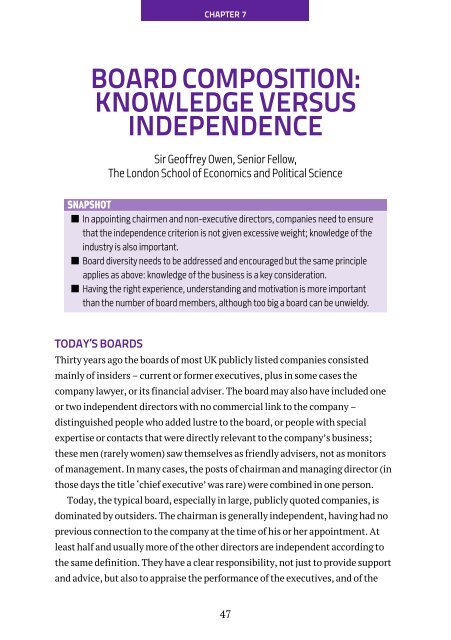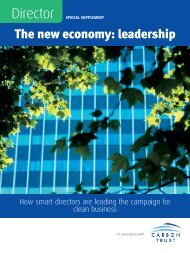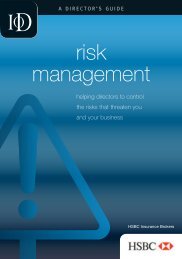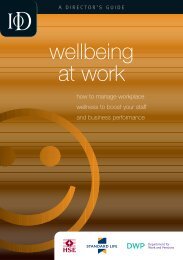Click here to download a pdf - Director Magazine
Click here to download a pdf - Director Magazine
Click here to download a pdf - Director Magazine
Create successful ePaper yourself
Turn your PDF publications into a flip-book with our unique Google optimized e-Paper software.
CHAPTER 7BOARD COMPOSITION:KNOWLEDGE VERSUSINDEPENDENCESir Geoffrey Owen, Senior Fellow,The London School of Economics and Political ScienceSNAPSHOT■ In appointing chairmen and non-executive direc<strong>to</strong>rs, companies need <strong>to</strong> ensurethat the independence criterion is not given excessive weight; knowledge of theindustry is also important.■ Board diversity needs <strong>to</strong> be addressed and encouraged but the same principleapplies as above: knowledge of the business is a key consideration.■ Having the right experience, understanding and motivation is more importantthan the number of board members, although <strong>to</strong>o big a board can be unwieldy.TODAY’S BOARDSThirty years ago the boards of most UK publicly listed companies consistedmainly of insiders – current or former executives, plus in some cases thecompany lawyer, or its financial adviser. The board may also have included oneor two independent direc<strong>to</strong>rs with no commercial link <strong>to</strong> the company –distinguished people who added lustre <strong>to</strong> the board, or people with specialexpertise or contacts that were directly relevant <strong>to</strong> the company’s business;these men (rarely women) saw themselves as friendly advisers, not as moni<strong>to</strong>rsof management. In many cases, the posts of chairman and managing direc<strong>to</strong>r (inthose days the title ‘chief executive’ was rare) were combined in one person.Today, the typical board, especially in large, publicly quoted companies, isdominated by outsiders. The chairman is generally independent, having had noprevious connection <strong>to</strong> the company at the time of his or her appointment. Atleast half and usually more of the other direc<strong>to</strong>rs are independent according <strong>to</strong>the same definition. They have a clear responsibility, not just <strong>to</strong> provide supportand advice, but also <strong>to</strong> appraise the performance of the executives, and of the47









